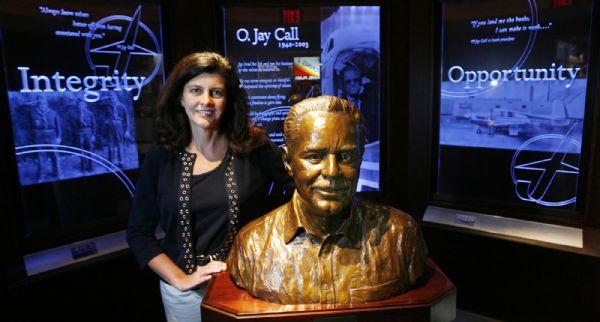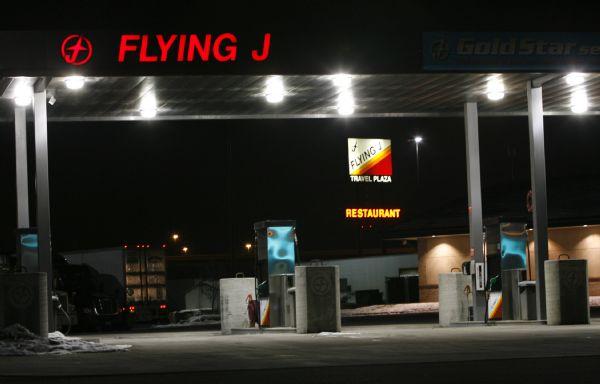This is an archived article that was published on sltrib.com in 2009, and information in the article may be outdated. It is provided only for personal research purposes and may not be reprinted.
Last October, Flying J announced it could proceed with a $300 million modernization of its Bakersfield, Calif., refinery after local officials finally approved the company's updated plan more than three years after it was presented.
Two months later, Ogden-based Flying J was bankrupt, with money draining out of the travel center, refinery company and diesel fuel distributor faster than it was coming in.
At the time, Flying J blamed the abrupt fall in oil prices from record highs in July. A sudden freeze in credit markets that started in September aggravated the company's problems.
But the real story of Flying J's road to bankruptcy began several years earlier. It led ultimately to the ignominious exit of Flying J's longtime CEO in January, just four weeks after the company and its Big West Oil and Longhorn Pipeline subsidiaries sought protection from debtors in a court in Delaware.
It also set in motion a number of actions that will result in Flying J becoming a much smaller company.
The current CEO, Crystal Call Maggelet, assigns much of the responsibility for the bankruptcy to J. Phillip Adams, who led Flying J for almost two decades. Adams, said Maggelet, was an empire-builder who wanted to put Flying J on the map without giving enough consideration to the possible financial ramifications.
"Phil is all about growing the top line and revenue growth. He wasn't always that excited by profitability. Although Flying J did fine [for many years], I think that you could argue, given the revenue growth that we had, that our profitability really didn't match our revenue growth," said Maggelet, the daughter of founder Jay Call and a member of the board of directors for over 20 years.
James Shein, a professor at Northwestern University's Kellogg School of Management and crisis management expert who joined Flying J's board of directors earlier this year, said the board and the company's creditors had lost faith in Adams because of his "obsession" with growing revenues instead of focusing on profits.
Shein said Flying J was in such bad shape that creditors, angry because the company they thought was a "perfectly safe" investment had gone into bankruptcy without warning, could have forced Flying J to liquidate.
"I don't think the board was fully informed [by Adams]. I do know that [Maggelet] was as shocked as the creditors were shocked how much trouble the company was in," Shein said.
Adams did not respond to several calls seeking comment.
--
Cash to burn » The underpinnings of the bankruptcy go back to 2005. At the time, Flying J was a successful company with lots of cash from its travel centers sitting idly in a bank. Adams, a seasoned CEO who had the board's trust, decided to buy the Bakersfield refinery from Shell Oil Co.
Terms of the deal weren't disclosed. But the refinery had the potential to be a huge money-maker. It could process up to 70,000 barrels of crude oil a day and produced about 2 percent of California's gasoline supply and 6 percent of its diesel.
But the refinery, built in the 1930s, needed major improvements in order to fit with Flying J's plans.
"It was a piece of junk," said Jack Humphreville, an analyst who writes for the Web site Trucker.com. "It was just an old refinery that Shell wanted to get rid of because it was inefficient. Shell wasn't making any money. It was an old teapot."
Adams thought the refinery could be a gold mine. The plan Flying J devised would boost the refinery output to meet 3 percent of California's gasoline requirements and 11 percent of its diesel needs. The company submitted its plans to regulators, expecting approval in about six months, Maggelet said.
Instead, the process dragged on more than three years, until the Kern County, Calif., board of supervisors signed off on Flying J's plan in October. In the meantime, Adams approved the purchase of pricey equipment for the plant even though its profitability was uncertain month to month, she said.
Maggelet said Bakersfield would have been a "slam-dunk" if Flying J had gotten the permits quickly.
"But having to have it go on for so long and making decisions to purchase very expensive equipment before permits were acquired was not necessarily a good idea either," she said.
--
Another bet » In 2006, Flying J made another gamble. It bought Longhorn Pipeline Holdings, a Houston refined petroleum products distributor that owned a 700-mile mile pipeline running between the Gulf Coast and El Paso, Texas, where it owned a terminal able to store a million barrels.
Adams wanted the pipeline because it could help Flying J sell gasoline and diesel in markets across the rapidly growing Southwest. But like Bakersfield, the pipeline needed improvements to meet Flying J's profit expectations.
"So there was cash going out to support those two businesses. There was a lot of cash coming in from retail and refining. But at the end of the day, there wasn't enough cash coming in from those other two places so that when oil prices fell in the fall it basically sort of zapped our liquidity," Maggelet said.
The severity of the fall -- from a high of $147 a barrel in July to about $42 when Flying J filed for bankruptcy in December -- wasn't clearly understood by Flying J's board until almost the last moment. Maggelet said she learned Adams was going to seek bankruptcy protection only a week before the Chapter 11 petition was submitted to the court.
--
All in family » Maggelet is a friendly, but forceful, character. With a master's of business administration degree from Harvard University, she co-founded the Crystal Inn chain with her father. After the first inn succeeded, Maggelet and her husband, Chuck, started McCall Management, which now has 11 hotels.
Maggelet adored her father, who started Flying J in 1968 a few years after his daughter's birth. Jay Call died in 2003 when a plane he was piloting crashed 40 miles southeast of Hailey, Idaho.
At the time, Maggelet was 38 years old.
"In an instant, my life changed," she said last year at a ceremony during which Utah State University's Jon M. Huntsman School of Business presented her a distinguished alumnus award .
"Not only had I lost a man I loved and respected, I was now the majority shareholder, along with my brother [Thad Call], of a large corporation with thousands of employees," she said.
Call was Flying J chairman when he died. Adams was president and CEO. The company's sales that year totaled $4.6 billion and Forbes magazine ranked the business as No. 45 among the 500 largest private companies in the U.S.
By 2008, sales had grown to $18 billion and Flying J had moved to No. 16 on the prestigious Forbes list.
"He had really grown Flying J," Maggelet said. "Phil Adams really was what Flying J was. My dad, Jay, had stepped away in the early 1990s, so Phil had grown the company, at the end of the day."
Crucial meeting » The board had trusted Adams over the years and had given him a lot of independence. Maggelet acknowledged a lot of his decisions had been good for the company.
Yet when the bankruptcy happened, Maggelet was not ready to let Adams decide how the company would be restructured. She wasn't sure if he knew if bankruptcy was in the cards in the weeks leading up to the filing, and if he did, he wasn't vocal about it. She decided to take an active role in the company's operations.
"It was still my family business, and ultimately we had a lot of employees and we had a lot of people we owned a lot of money. And it was very important to me to step up and try to rectify that as best I could," Maggelet said.
She met with Adams in mid-January. Maggelet said she did not go into the meeting intending to get him to resign. She remembers the conversation as a frank discussion of what his role would be during the bankruptcy.
"He wasn't fired. He wasn't asked to resign. I would characterize [the dialogue] as, I don't know if you'd say friendly, a cordial discussion about the direction of the company," she said.
Maggelet said Adams was accustomed to acting with a free hand. He chafed at the restrictions imposed on him by the bankruptcy and questioned whether there was still a place for him at the company.
"He's used to being very autonomous. And that wasn't the way it was going to be. That's not the way it is in bankruptcy, as you can imagine. You have people all the time questioning everything you do and helping you make decisions, and all those things that would happen," Maggelet said.
"And he would not have enjoyed being in that environment, and I think he knew that," she said.
A 15-minute exchange of views had decided the outcome of Adams's 22-year Flying J career. On Jan. 19, the company announced Maggelet had taken the job of president and CEO and Adams had resigned.
For sale » In quick order, Maggelet put the Bakersfield refinery and Longhorn Pipeline up for sale to raise cash and pay its creditors. She shut Bakersfield while the company searches for a buyer. Longhorn was sold 11 days ago for about $350 million, slightly more than what Flying J paid for it three years earlier. The deal with Magellan Midstream Partners took just five weeks to complete.
More significantly, Flying J reached a preliminary agreement last month to merge its network of 270 travel centers with those of its rival, Pilot Travel Centers.
Pilot, based in Knoxville, Tenn., will be the majority owner. Flying J will have a stake in the merged company, but the size hasn't been decided. It depends on how much cash versus Pilot stock Flying J will get if the deal closes. The Ogden headquarters will become a Pilot regional office.
Pilot representatives declined a request for comment. But the analyst Humphreville saw the acquisition as "a masterly constructed transaction" that rescued Flying J from "sharks" that might have torn the company apart.
"I haven't see the finances of Flying J. But from my perspective they will probably get a better deal from Pilot than they would from anybody else," Humphreville said.
Lesser-known businesses Flying J Oil & Gas and Haycock Petroleum also are for sale. The company will retain its Transportation Alliance Bank, its North Salt Lake refinery and its credit card processing operations.
Maggelet refuses to say how big Flying J will be when the dust settles and the company emerges from bankruptcy with its debts paid, probably before January. But she's certain Flying J won't be among the top 20 private companies in the U.S. next year.
It's a twist of fortune that Maggelet says doesn't bother her. Profitability was always more important to her than size. She said she never bragged about Flying J's steady climb to the top of Forbes' list, unlike Adams.





